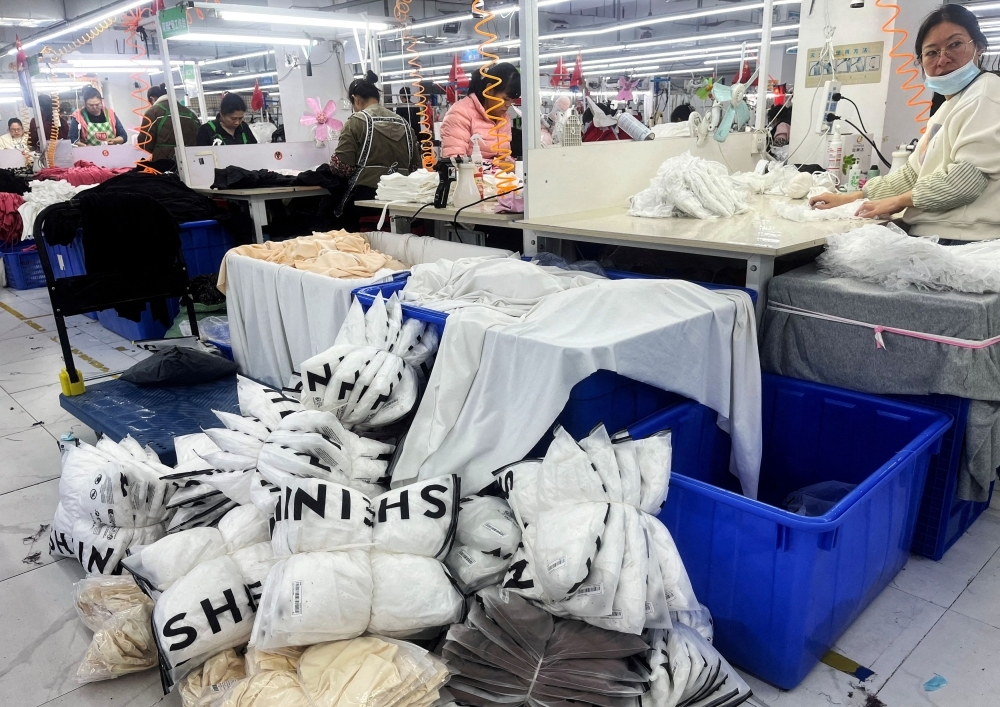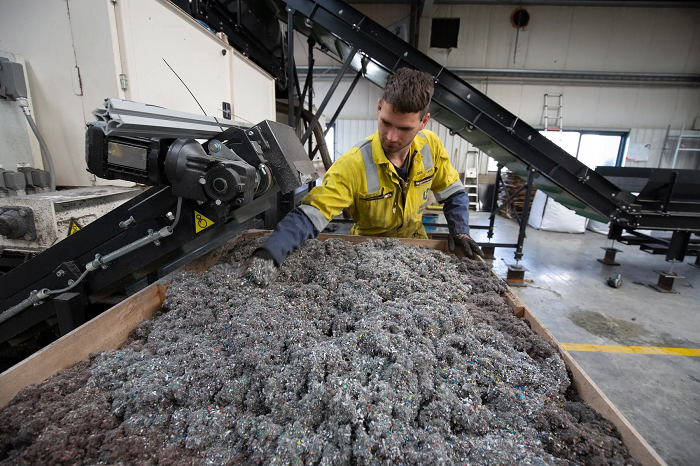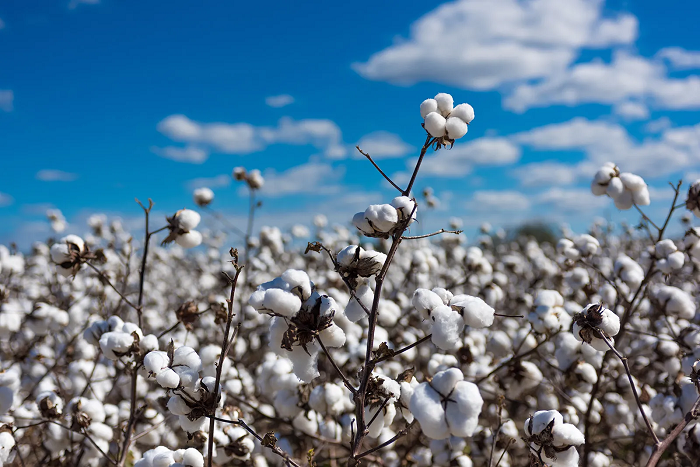FW
Adriano Goldschmied, known as the godfather of denim, will launch his limited edition of Godfather of Denim knit tee, made in LA with Tencel Lyocell branded fibers. Proceeds from the tee shirt sale will be donated to Greenpeace, an NGO supporting the protection and conservation of the environment, as well as promoting peace. The brand will launch ‘THE G’ which are beautiful 100 per cent Tencel ™ Lyocell T-shirts made in a superfine yarn.
Goldschmied is working on many different projects from design to textiles and almost all are focused on sustainability. The brand recently eedesigned the method of work, have more efficiency and speed and introduce the digital work at all the levels in order to have control, more creativity and make better products. Be closer to the consumer and integrate the new demand in the new products and communicate back immediately.
Lenzing has developed a new technology platform. The web technology is a nonwoven web formation process that starts with botanic wood pulp and produces a nonwoven fabric made of 100 per cent continuous Lyocell filament.
This web can be integrated with standard non-thermal based nonwoven bonding technologies, such as hydroentangling and needle punching. The technology enables a unique self-bonding mechanism where filaments bond into a fabric during the laydown process. This self-bonding mechanism enables a product range with a much wider variety of surface textures, drapeability and dimensional stability than other nonwoven technologies utilizing 100 per cent cellulosic fibers.
The flexibility of the technology and the possible integration with other nonwoven and textile technologies will enable the development of a broad range of composite structures for highly engineered end use applications. Consumers have become more aware of the negative impact of plastics in waterways and marine ecosystems. The new Lenzing web technology will enable the value chain to create more innovative applications out of natural, biodegradable cellulose materials.
The web technology is a perfect example of Lenzing’s testament for strategic growth and its commitment to developing new breakthrough innovations by providing more sustainable products to consumers. The nonwoven segment currently represents 30 per cent of Lenzing’s core business.
ThreadSol is all set to explore the African apparel industry to transform manufacturers to super vendors. The innovative garment tech company participated in Origin Africa event 2018 held in Kenya. At the fair, ThreadSol presented its range of innovative software solutions for the African apparel manufacturers. ThreadSol is also set to participate in the next African event of ATF (International Apparel, Textile and Footwear trade exhibition) from November 20 to 22 in Cape Town to present the solutions.
ThreadSol’s innovative solutions transform the manufacturers to super vendors. The solutions, intelloCut and intelloBuy reduce planning time by almost 80 per cent and fabric sourcing cost by acting on data and insights. These solutions are powered by the latest IT technologies of artificial intelligence, Big Data, and Mobility. Consequently they reduce lead time and cost for manufacturers enabling them to handle more styles, cater to in-season change and at the same time, improve the topline and bottom line of their businesses.
The Indonesian minister of trade Enggartiasto Lukita has urged the Indonesian Textile Association (API), the textile and textile product industry (TPT) to increase production, so that they can dominate the domestic market. He hoped TPT can encourage exports to markets, such as the United States and Europe. Thus, it continues to accelerate the completion of foreign trade negotiations. He said his team had completed negotiations between the Chile, Palestine, ASEAN-Hong Kong FTA and Investment Agreement, ASEAN Comprehensive Investment Agreement (AMA), etc. While some negotiations are still in process including Indonesia-Australia CEPA, Indonesia-European CEPA, Indonesia-EFTA CEPA, Indonesia-Iran PTA among others.
In addition to completing the agreement, the ministry of trade will also bring together the API with the Indonesian Chamber of Commerce and Industry (Kadin) to work together to increase TPT.
Esprit group revenue has fallen 11.1 per cent. Germany, Esprit’s largest market, accounted for about half of total sales. For the rest of Europe, America and the Middle East, sales fell 9.8 per cent, and in Asia Pacific, which accounts for just 12.3 per cent of total revenue sales fell 15.2 per cent. Offline sales in Asia-Pacific fell 17.1 per cent and online sales fell 5.3 per cent.
Esprit was affected during the year by the rapidly evolving retail industry, fueled by the continuous growth of e-commerce leading to changes in consumer consumption patterns, and the intensification of price competition driven by both pure digital players and fully vertical retailers.
Despite the operating loss, the company remained in a healthy financial position, debt-free and with a net cash balance of 790 million dollars. Some of that cash was used to repurchase about 2.9 per cent of the company’s shares.
The company has warned shareholders of a further drop in sales for the current financial year in the low double-digit percentage range year on year, mainly due to the continuing rationalisation of its distribution footprint and further decline in customer traffic amid Esprit’s execution of a plan to rebuild store visitor numbers.
H&M brand COS will open its flagship store at Tmall, strengthening its presence in China. This is expected to be the brand’s only online shopping channel in China, apart from its official site. The offerings will include a wide selection of COS’ women’s wear, menswear and children’s wear lines.
COS is expanding operations across China by opening a new brick-and-mortar flagship store in Shanghai, and new stores in major cities like: Beijing, Xiamen and Guangzhou. Launched in China in 2012, COS has 28 stores across 17 cities.
The brand will install its famous structure 'New Spring' in a historial building in Shanghai, giving Chinese consumers the chance to take part in the multi-sensory installation from October 20-28. Created in collaboration with London-based design duo Studio Swine, the tree-like structure that blossoms with mist-filled, scented bubbles was specially commissioned for last year’s Salone de Mobile, one of the world’s biggest furniture and design fairs, held annually in Milan.
In tandem with the pop-up installation, the brand will feature a curated selection of COS apparel, available for purchase on Tmall and in select physical storefronts across China.
China plans to levy $60 billion as tariffs on US goods in retaliation to the 10 per cent tariffs that the Trump administration levied on $200 billion Chinese goods. The tariffs will be on items ranging from meat to wheat and textiles, and will take effect on September 24. President Trump has also threatened additional punitive measures against China if it targets "politically potent" US agricultural products. Earlier too, the Trump had levied a 25 percent tariff on about $50 billion in Chinese goods, and China responded in kind.
The American Apparel & Footwear Administration (AAFA), during its public review detailed the extreme damage this new tax will cause to the industry and its four million US workers. However, most of those pleas were ignored.
"In the past few years, the EU has contributed €69 million under EU4Business in Georgia, triggering €882 million worth of loans to Georgian companies, supporting almost 40,000 enterprises and creating more than 10,000 new jobs. Funded by the EU and implemented by GIZ, the ‘SME Development and DCFTA in Georgia’ project helps small and medium-sized Georgian enterprises (SMEs) become more competitive and adapt to the new regulatory environment created under the DCFTA. It lays the ground for strengthening of the SME sector to ensure a broad-based growth. The project is part of the EU4Business initiative, which brings together all EU programmes assisting SME and private sector development in Georgia."
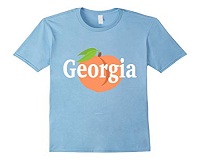 In the past few years, the EU has contributed €69 million under EU4Business in Georgia, triggering €882 million worth of loans to Georgian companies, supporting almost 40,000 enterprises and creating more than 10,000 new jobs. Funded by the EU and implemented by GIZ, the ‘SME Development and DCFTA in Georgia’ project helps small and medium-sized Georgian enterprises (SMEs) become more competitive and adapt to the new regulatory environment created under the DCFTA. It lays the ground for strengthening of the SME sector to ensure a broad-based growth. The project is part of the EU4Business initiative, which brings together all EU programmes assisting SME and private sector development in Georgia. It enables the private sector to take advantage of the opportunities offered by the EU Deep and Comprehensive Free Trade Agreement, which gives Georgia access to a common market of 500 million consumers.
In the past few years, the EU has contributed €69 million under EU4Business in Georgia, triggering €882 million worth of loans to Georgian companies, supporting almost 40,000 enterprises and creating more than 10,000 new jobs. Funded by the EU and implemented by GIZ, the ‘SME Development and DCFTA in Georgia’ project helps small and medium-sized Georgian enterprises (SMEs) become more competitive and adapt to the new regulatory environment created under the DCFTA. It lays the ground for strengthening of the SME sector to ensure a broad-based growth. The project is part of the EU4Business initiative, which brings together all EU programmes assisting SME and private sector development in Georgia. It enables the private sector to take advantage of the opportunities offered by the EU Deep and Comprehensive Free Trade Agreement, which gives Georgia access to a common market of 500 million consumers.
As Rati Anjaparidze, Project Expert, ‘SME Development and DCFTA in Georgia’ says, enterprises that have been successfully audited under the amfori BSCI system will be able to diversify their export markets and client base more. There are cases when apparel producers have one or two clients, which is a high risk. In case the client’s interest change or if for any other reason the client stops buying, the supplier company is left without a client on the European market. Therefore, a high ranking for amfori BSCI enables you to establish more stable contacts with European clients and become a reliable partner in their eyes.
In line with this, it is important for EU companies to have partnerships with enterprises where employers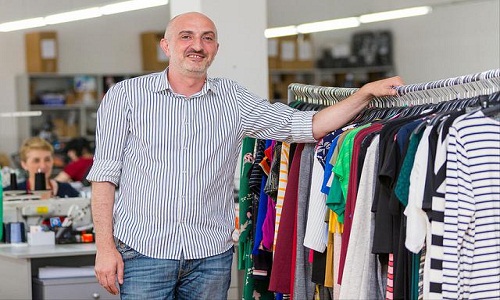 assume responsibility to protect their employees’ labour rights, they are also interested in having reliable suppliers. In the EU, industry players also assume social and other responsibilities and establish relevant standards both for local, European producers, as well as the global supplier chains.
assume responsibility to protect their employees’ labour rights, they are also interested in having reliable suppliers. In the EU, industry players also assume social and other responsibilities and establish relevant standards both for local, European producers, as well as the global supplier chains.
The EU and GIZ project is also cooperating with three more companies in preparing them for the amfori BSCI audit – Elselema, Eurotex and Materia Fashion House. The elaboration of a National Strategy for Apparel Sector Development is also planned with EU and GIZ assistance, which should encourage diversification and exports of goods produced in Georgia.
Success story
One of the most successful companies in Georgia, MPT Georgia has been producing apparel products for Danish multi-brand fashion group DK Company, a leading fashion company in Europe, for the last three years. The labels of various brands that are part of the group – Coop Denmark, Denim Hunter, B-Young, Fransa – read ‘Made in Georgia’ in nine languages. The Danish company sells MPT Georgia-made clothing in Germany, the UK, Norway and Canada. MPT Georgia upgraded its manufacturing facilities in 2015 thanks to €100,000 of Danish investment. DK Company is MPT Georgia’s main and constant client; however, the Georgian manufacturer has also cooperated with other Danish companies in the past, such as Kompagniet and Qiero. Mikheil Getia, head, MPT Georgia, stated that the rating recently received as a result of undergoing an ‘amfori BSCI (Business Social Compliance Initiative) audit’ – will help the company find other clients in the future. However, in order to do that, MPT Georgia will have to increase its production, as current production capacity is fully utilised at this stage.
Georgia’s advantage on that market is that Georgian company can produce and export small amounts of apparel products in a short period of time. According to Getia, the Georgian apparel business is barely represented internationally. However, Georgia can attract new clients through introducing European standards in manufacturing. Additionally, our country has one advantage, ability to produce and export relatively small amounts of goods to the relevant destinations in a very short period of time.
Agoa expo and trade fair will be held in New York from September 25 to 30. This is a business platform committed to celebrate US-Africa cooperation, strengthen bilateral trade relations, promote Agoa key export products and investment opportunities. It is an opportunity for US companies to expand business or introduce new products and services in the 40 African countries.
The trade fair is a business opportunity for African apparel, textiles, footwear, skins and leather products. The event will also host meetings, round tables, B2B conferences and workshops to focus on important topics to build capacities, raise awareness, present business opportunities and encourage trade between the United States and African countries.
A fashion week will present a platform for African fashion designers to update their knowledge about Agoa apparel and textile products, what they are eligible to export to the United States or to learn about the Agoa apparel exports process. Agoa experts from the US will train participants during workshops and master classes to help them increase their production, have more customers everywhere in America. It is also an opportunity to source, network with US manufacturers, machinery, yarn and fabrics companies, buyers and retailers.
Agoa provides eligible sub-Saharan countries duty-free access to the United States.
The Readymade Garment Exports (RMG) sector is continuously declining. From August to April the sector declined by 12.12 per cent to reach $6.61 billion down from $7.522 billion in April 2018. The major reasons are: rising cotton prices, GST and reduction in duty drawbacks. Post-GST, reduction in duty drawback, and remission of state levies are some of the other factors that have affected the industry badly.
The negative trend in export has become one of the most worrying factors affecting the RMG industry. Recently, the export fraternity met the Apparel Export Promotion Council (AEPC) discussing the ongoing challenges in the industry. But an announcement is yet to be made as they believe that it may negatively impact the relationship with their clients.
A delay will drive buyers to competitors Bangladesh, Vietnam, Ethiopia, Myanmar. And once they settle there it would be difficult to bring lure them back to India. Meanwhile, the season will go off with partial orders.




